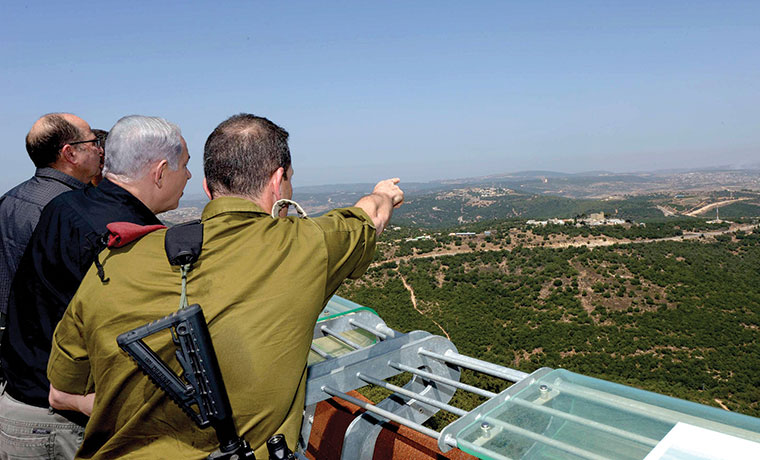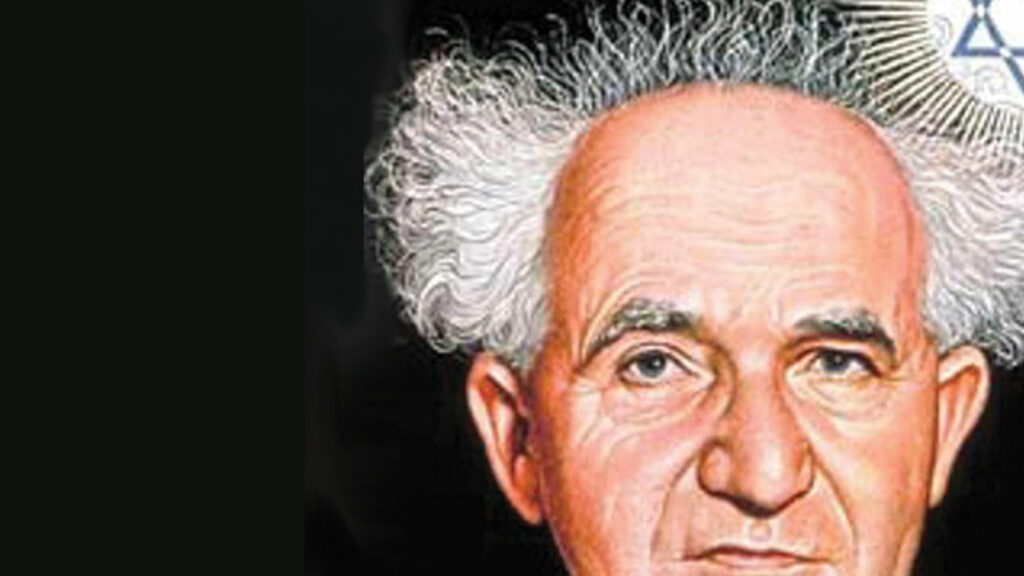Strategic Imperatives
Israel began as an exceedingly small country surrounded by vastly larger, more populous, and wealthier enemies. In the early 1950s, David Ben-Gurion and several Israel Defense Forces (IDF) generals responded by formulating a national security strategy that rested on the three pillars of “deterrence, early warning, and decision.” Since Israel could never attain total victory over its neighbors, it could only aim to defeat the enemy in each round of battle and delay the next round for as long as possible. To do so, Israel had to be perpetually prepared and alert. It had to maintain strong intelligence capabilities and be ready to launch preemptive strikes and preventative wars based on that intelligence whenever necessary. It would have to augment its small standing army with a large pool of reserves that could be mobilized on short notice and rapidly move any fighting onto the enemies’ territory. Maintaining a qualitative edge in terms of technology and human resources would be vitally important, and it would be necessary to have strong airpower and armored forces. Finally, Israel had to avoid going to war without the support of a global power, and, once it began a war, it should endeavor to keep it short and to obtain decisive results.
Looking back, it is clear that the Six-Day War of 1967 was the last conflict in which these principles were entirely relevant. The Yom Kippur War in 1973 resulted from Israel’s failure to implement them fully, and in the years after that Israel’s strategic environment altered decisively. Peace was reached with Egypt in 1978, with Jordan in 1994, and the threat from Iraq vanished following the U.S. attacks in 1991 and 2003. As a result, Israel’s conventional force is decidedly stronger than that of its enemies, and the old asymmetry has now been largely reversed. But Israel’s enemies have developed a system of warfare based on long-term attrition through nonconventional means by nonstate actors (terrorist attacks, indiscriminate missile launches, and so on). Meanwhile, a new existential threat to Israel’s very existence has emerged: Iran’s drive for nuclear weapons. In short, Israel is in a radically different position than it was under Ben-Gurion.
This shift in the balance of power and enemy tactics requires a new security strategy, but three main obstacles have made it difficult to update Israel’s security concept. First of all, it is impossible to think through national security without discussing borders, which means discussing the future of the territories captured in 1967, but this drags professional assessments into uncertain and highly politicized terrain. Second, the strategic capabilities attributed to Israel’s facilities in Dimona have not been included in the country’s public discourse on national security despite potentially comprising an important component. Third, most of the experts on Israel’s national security strategy are either current or former senior IDF officials, and so it is no surprise that their perspectives are heavily focused on military factors and often fail to adequately integrate diplomatic and political factors into a broader strategy to advance Israel’s national interests.
Charles Freilich doesn’t come from Israel’s officer corps, though he has worked for its government as a senior analyst at the Ministry of Defense and as deputy national security advisor. His 2012 book Zion’s Dilemmas: How Israel Makes National Security Policy demonstrated the depth of his understanding of the ways in which previous Israeli leaders have dealt with their nation’s fundamental defense predicaments. Now, in Israeli National Security: A New Strategy for an Era of Change, he brings this knowledge to bear on the question of how future governments ought to cope with them. His comprehensive and thoughtful treatment of these matters nicely complements IDF Strategy, the document presented to the Israeli public in 2015 by Chief of Staff Lt. Gen. Gadi Eizenkot, which approached national security from an operational point of view.

National security, as Freilich understands, involves a great deal more than military capacity. Israel “faces foreign policy and demographic challenges,” he writes, “that may prove to be almost as dangerous to its long-term future as the military threats, in some ways maybe more so.” To escape these dangers, Israel should seek to resolve its conflict with the Palestinians. Freilich correctly suggests that Israel should not only win the “blame game” by demonstrating that it remains willing to accept a peaceful solution along the lines of the “Clinton Parameters.” But, Freilich argues, Israel should also be willing to take independent action if no agreement can be reached and unilaterally initiate a disengagement process from the Palestinians. Unfortunately, a two-state solution will be more difficult to successfully implement now than it would have been around the time of the 2000 peace negotiations at Camp David because the radical organization Hamas has grown so much stronger and divided Palestinian governmental authority, while, at the same time, the Palestinian Authority has staked out hardline positions. Nonetheless, Freilich’s advice is timely: The Trump administration may have provided a window of opportunity for Israel to make progress on this issue under favorable conditions. If so, this would allow Israel to channel its resources more effectively towards countering dangers that likely cannot be resolved with diplomacy—like the Iran-Syria-Hezbollah threat.
Freilich devotes the bulk of Israeli National Security to providing a framework for Israel to assess such threats. The greatest of these is, of course, the danger that lies behind the proxy skirmishes on the northern border: a nuclear Iran. “The dangers posed by a nuclear Iran,” writes Freilich, “include the possibility of actual use of nuclear weapons, devastating for any country, but certainly tiny Israel, whose population is concentrated in a small area and which, as former Iranian president Rafsanjani once infamously stated, could be destroyed by one bomb.” But even the mere threat of the use of such weapons could have “dire ramifications for Israel’s strategic calculus and freedom of maneuver.”
Freilich acknowledges that the Iran nuclear deal (the Joint Comprehensive Plan of Action or JCPOA) “set the Iranian program back by several years at least,” assuming that the deal holds, but he soberly notes that “Iran will be better positioned to ‘break out’ in 2025–2030 than it was prior to the agreement.” The only way forward is to use the coming years to find new military and diplomatic ways to prevent Iran from going nuclear. In our view, at the same time that Israel invests in a viable military option to deal with the potential threat from Iran, it should work with the United States to design a parallel agreement to the JCPOA, rather than a formal defense treaty. This would constitute a joint plan of action for Washington and Jerusalem focusing specifically on concrete measures to roll back Iran’s nuclear ambitions and subversive regional activities.
Freilich, who teaches courses at the Kennedy School of Government, has a keen appreciation and understanding of the “special relationship” between the United States and Israel, but he also worries about it. “The price of the extraordinary bilateral relationship with the United States, including a de facto security guarantee, has been a significant loss of Israel’s independence and freedom of maneuver.” To regain some of this lost sovereignty, Freilich boldly suggests that Israel begin to phase out U.S. foreign assistance. But, assuming the JCPOA stands the test of time, any such phase-out would more or less coincide with the “sunset” phase of the nuclear agreement with Iran. Would this really be the moment to forgo American aid? The $3.8 billion of annual funding provided by the United States is about one-fifth of Israel’s defense budget and is not something that an Israel facing a renewed nuclear challenge from Iran could easily forgo.
Admittedly, proactively discontinuing this financial assistance might enable Israel to plan better in the short term than it could if aid were unexpectedly withdrawn, but it could also mean that Israel would be worse off in terms of arms and technology when a crisis occurs. Indeed, as anyone who has worked closely with Israel’s defense budget will attest, it would be extremely difficult to make even minor cuts without damaging the country’s defense industry and qualitative military edge.
President Trump’s repeated remarks about decreasing foreign aid and similar sentiments expressed by his predecessor against “free-riders” reflect a shift in Washington away from expenditures abroad to investment at home. However, the United States has little reason to unilaterally end its aid to Israel, which is its most loyal and dependable ally in the region. Moreover, it sees excellent returns in the form of shared technology and intelligence, as well as joint operations on the cyber and kinetic battlefields, according to U.S. media reports. Freilich is right that Israel must think through the possibility that the United States might cease providing aid to Israel at some point (the present commitment extends until 2027), but it would harm its capabilities by preemptively phasing out U.S. assistance of its own accord.
While seeking to diminish its dependence on the United States, Israel cannot avoid the conclusion that the U.S.-Israel alliance is irreplaceable. Russia or China might agree to sell weapons platforms to Israel—or not. But would either of those countries use a UN Security Council veto to defend Israel against the relentless and preposterous onslaught that Israel endures at the United Nations? Washington provides Israel with the kind of support it cannot find elsewhere. The alternative to dependence is not independence but isolation.

Descending from the level of existential threats to the more mundane problem of responding to terrorist actions, Freilich argues that “the very frequency of the attacks suggests that the deterrent effect has not succeeded.” But one cannot conclude from the common tit-for-tats across the border with Gaza and Syria that Israel’s responses are not working. For, as the “broken windows theory” has taught us, taking care of small violations can prevent further escalation. While there is undoubtedly a good deal of logic behind the idea of saving one’s resources and energies for major issues, there is also a clear relationship between policing minor violations and preventing major transgressions. Moreover, since the outbreak of the Syrian civil war, much of the fire that has hit the Israeli side has been spillover from a chaotic situation and unprofessional armed forces.
Deterrence involves demonstrating the ability to destroy enemy assets as leverage in order to discourage conflict, yet Israel is under attack from Sunni and Shi’ite jihadists who seek “martyrdom” and are therefore very hard to deter. Nevertheless, there are several examples in which Israel has managed to deter the “undeterrable,” including seemingly unpredictable or irrational actors, as Graham Allison outlines in a 2016 article for the National Interest entitled “Why ISIS Fears Israel.” “Israel’s approach to ISIS,” he writes, “is straightforward. Israel seeks to persuade ISIS not to attack it by credibly threatening to retaliate. If you attack us, the thinking goes, we will respond in ways that will impose pain that exceeds any gain you can hope to achieve.”
Whatever qualms he has about the measures Israel has been taking to achieve deterrence, Freilich is surprisingly ready to describe Israeli policy towards the civil war in Syria as an example of “smart restraint.” “In many cases,” Freilich writes, “a policy of noninvolvement, even in the face of potentially significant consequences, or near noninvolvement, such as Israel has pursued regarding the Syrian civil war, is the wiser course of action.” What this ignores, of course, is that by adopting a passive approach to the Syrian civil war Israel not only permitted the resurgence of a mass-murdering dictator who had been on the brink of defeat but also set the stage for Damascus’s Iranian allies to gain a second foothold along Israel’s northern front.

While Freilich correctly classifies the threats along Israel’s northern front as strategic, one cannot ignore the degree to which they are intertwined with the existential threat posed by Iran. Whether it is as a result of the relaxation of nuclear enrichment restrictions as part of the JCPOA’s “sunset” clauses or because the deal has collapsed, Iran will likely advance closer to a nuclear weapon within the next decade, and there can be little doubt that it has learned from the way North Korean artillery threatens Seoul the importance of holding U.S. allies hostage with conventional weapons. If Israel is insufficiently vigilant or proactive in Syria, Iran could succeed in similarly positioning its forces or proxies vis-à-vis Israel and posing a vital threat that could effectively eliminate a military option to stop its nuclear program. Now that Iran has had the opportunity to set up camp in Syria and is determined to move forward with its plans to build advanced military infrastructure and capabilities, the stage has been set for a conflict that will preoccupy Israel—which is determined to stop Iran—instead of allowing it to enjoy the short-term benefits of JCPOA.
Potential threats to the homefront are for this and other reasons very much on Freilich’s mind. Freilich points to the need for further investment in defensive capabilities to protect the homefront, very much in the spirit of former deputy prime minister Dan Meridor’s addition of conventional “defense” to Ben-Gurion’s three pillars of “deterrence, early warning, and decision” in his comprehensive strategic review in 2006. As Freilich himself observes, Meridor’s 250-page confidential report was “probably the most ambitious attempt ever undertaken to formulate an Israeli defense doctrine,” though it “was never formally discussed by the IDF or cabinet, let alone adopted.” In addition to devoting special attention to the menace that a nuclear Iran would pose, Meridor’s report “stressed that in the absence of adequate defenses, rocket attacks could seriously disrupt efforts to mobilize the reserves and make it impossible for the IDF to respond to an attack rapidly.” Without denying the importance of these considerations, “defense” has two serious limitations. First, as we learned from the Maginot Line, the aboveground barrier around Gaza, and many other examples, every defensive measure can be neutralized by a skillful foe who leaves the defender playing “catch-up.” The advantage of bringing the fight to the enemy is that it forces him to adapt rather than the reverse. Second, although investing more in defense might lower the cost of war in terms of infrastructural damage as well as civilian casualties, no measure of deterrence can be established simply through defense. In this Ben-Gurion and his generals remain correct: The best defense for Israel is still a good offense.
In this important, perceptive book, Charles Freilich writes that Israel’s national security situation is as good as it has ever been, but this reality brings its own dangers, since it can encourage a more passive or complacent approach. If the next 70 years of Israel’s history are to be as successful as the past 70 years, Israel must maintain a proactive national security strategy with the goal of ensuring a secure, Jewish, democratic, and morally just state at its center. Freilich’s work is a very good start.
Suggested Reading
Riding Leviathan: A New Wave of Israeli Genre Fiction
A new batch of Israeli fantasy books may not contain Narnias, but they pound on the wardrobe, rattling the scrolls inside.
I Believe: A Poem
Please remember, contestants, to phrase your answer in the form of a question. —Alex Trebek, host of Jeopardy!™ I believe with a perfect faith in the coming of the messiah, though he may tarry. —Late medieval reformulation of Maimonides’ 12th Principle of Faith, Commentary to the Mishna, Sanhedrin, Perek Helek. In the days of the Messiah, each individual will…

Indispensable Man
In his effort to cut David Ben-Gurion down to size, Tom Segev blames him for failures that were not his and gives him insufficient credit for his achievements. A closer examination of the historical record reveals a greater man than the one Segev attempts to dissect.
The Last Bedtime Story: Roz Chast’s Sort-of Tour Guide
Realizing that her daughter knows nothing of the urban wilderness her mother once inhabited, Roz Chast takes it upon herself to bequeath her accumulated wisdom in the method most natural to her, a comic book.
Comments
You must log in to comment Log In